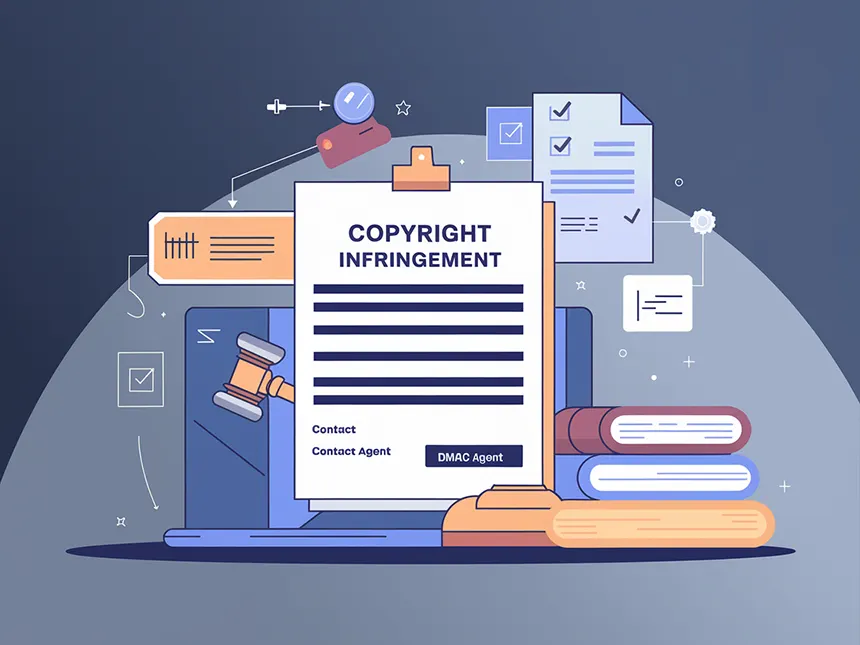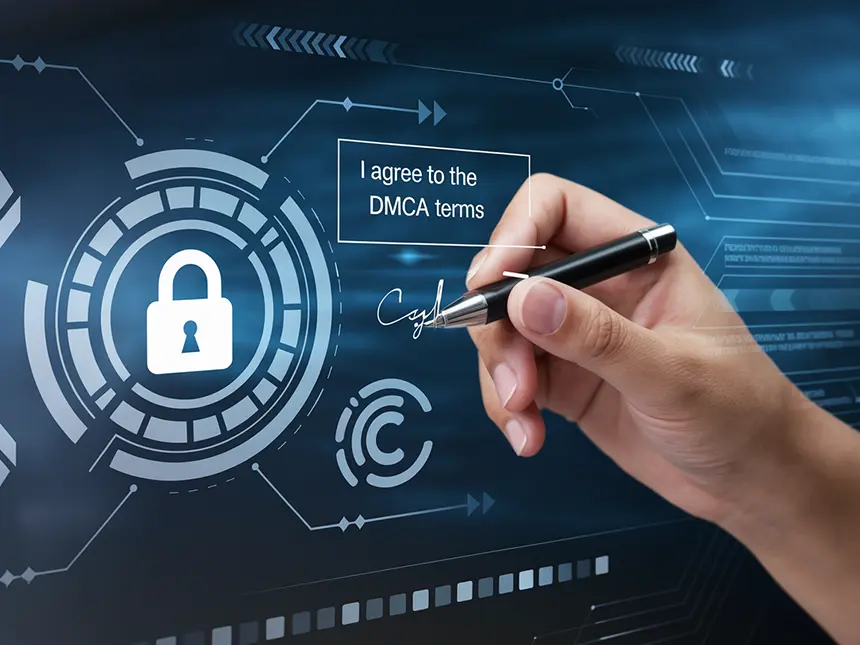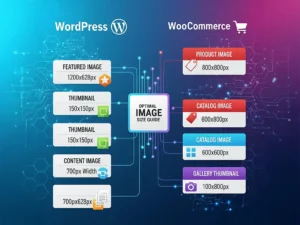Introduction
The digital age has brought great advances in the way we create, share and consume content online. However, with these advances has also come the need to protect copyright in the digital environment. To this end, the Digital Millennium Copyright Act (DMCA) was created in the United States to protect copyright in the digital world. But what exactly is the DMCA, and how can you ensure that your website complies with this law?
In this article, we’ll explore what the DMCA is, its main requirements and how you can protect your website legally and avoid penalties. We’ll also talk about the differences between the DMCA and Portuguese Copyright Law and why you should respect the Digital Millennium Copyright Act if you want to use Google AdSense on your website.
What is the DMCA?
The Digital Millennium Copyright Act (DMCA) is a US law passed in 1998 that aims to combat copyright infringement in the digital world. The DMCA focuses mainly on protecting digital content, such as videos, music, images and other types of media, from unauthorised copying and distribution. Although it is a US law, it is relevant to global websites, since many online businesses have users or content accessible in the United States.
How does the DMCA work?
The DMCA establishes a set of procedures that allow copyright holders to protect their works online. One of the main mechanisms is the process of notification and removal. When someone believes that their protected content has been used without authorisation on a website, they can send a DMCA notice to the site owner asking for the content to be removed.
In addition, the DMCA includes protection for websites, called the safe harbour. This protection ensures that if a site follows the notification and removal procedures correctly, it will not be held responsible for the content published by its users.
Steps to Ensure Your Website’s Compliance with the DMCA
1. Appointment of a Copyright Agent
The first step in ensuring compliance with the DMCA is to appoint a copyright agent. This agent will be responsible for receiving copyright infringement notifications and implementing the content removal process. The agent should be registered with the U.S. Copyright Office, and their contact details should be visible on your website.
2. Implementation of a Notification and Removal Process
You should have a clear, DMCA-compliant process, including information such as the need to act quickly and appropriately to ensure the legal protection of the safe harbour. This includes creating a page on your site where users can submit their notifications. These notifications should include information such as a description of the protected work, the location of the infringing content and a statement of good faith.

3. Recidivist Offenders Policy
To protect yourself legally, you need to have a recidivist infringers policy. If a user repeatedly violates copyright, you should suspend or remove their account to avoid future problems.
4. Content protection with DRM
If you market digital content, such as photos or videos, you can use Digital Rights Management (DRM) measures, such as watermarks or tools that prevent unauthorised copying of your products. It is important to ensure that these measures are properly implemented and comply with international laws, in addition to the DMCA, to avoid infringement by users outside the US.
The Importance of DMCA Compliance
Complying with the Digital Millennium Copyright Act not only protects your website from legal penalties, it also demonstrates your commitment to respecting copyright. Furthermore, compliance with the DMCA can increase your users’ trust, especially if your site allows third parties to share content.
Comparison between the DMCA and Portuguese Copyright Legislation
1. Legal Basis and Jurisdiction
- Digital Millennium Copyright Act (USA): This is a US law created to combat digital piracy and online copyright infringement. The DMCA applies to any website that operates or is accessible in the US, even if the site owner is based outside the country. It includes provisions for the removal of infringing content through infringement notices and protects websites that follow these processes (safe harbour).
- Portuguese legislation (Portugal): In Portugal, copyright protection is regulated by the Code of Copyright and Related Rights, in line with European Union directives. Portuguese legislation applies to protected works that have been created or published in national territory or that belong to Portuguese citizens, with a strong emphasis on the protection of literary, artistic and scientific works, whether in the physical or digital environment. Jurisdiction applies only to national territory and the European Union.
2. Content Notification and Removal
- Digital Millennium Copyright Act (USA): The DMCA allows copyright holders to send a takedown notice to the website operator, demanding the removal of content that violates their rights. This notification must follow a formal process and include specific information, such as the location of the content and a statement of good faith. The website must act quickly to remove the content or disable access, or face legal action.
- Portuguese legislation: In Portugal, the process of removing online content may involve notifying the website or internet service provider, depending on the situation. However, Portuguese legislation also allows for a complaint to be lodged with the judicial authorities, who can order the removal of infringing content. The implementation of a formal notification and removal process is not as structured as in the Digital Millennium Copyright Act, with legal recourse being a more common practice.
3. Legal protection for websites
- Digital Millennium Copyright Act (USA): The DMCA offers a protection known as the safe harbour, which exempts website operators from legal liability as long as they follow the notification and removal procedures correctly. To benefit from this protection, the site must have a designated DMCA agent, clear notification policies, and act promptly in response to copyright complaints.
- Portuguese legislation: In Portugal, there is no formal ‘safe harbour’ protection as in the DMCA. However, service providers can avoid liability if they demonstrate that they acted in good faith and were not aware of the copyright infringement. If the infringing content is removed after notification, the service provider can avoid legal consequences.
4. Anti-copying and DRM tools
- Digital Millennium Copyright Act (USA): The DMCA prohibits the creation and distribution of tools that circumvent Digital Rights Management (DRM) measures. This measure aims to protect copyright holders, especially in digital content such as music and films.
- Portuguese legislation: Portuguese legislation also protects the use of technological measures to protect digital works, but these measures are integrated into European Union directives, namely through Directive 2001/29/EC, which prohibits unauthorised access to protected content and the manipulation of DRM systems.
Relevance of the DMCA for Google AdSense
Google is a US company, and its terms of service for products such as Google AdSense comply with US law, including the DMCA. Although your site is in Portugal, by using Google AdSense, you may be accepting contracts that have clauses relating to the DMCA. This means that you may be obliged to implement content notification and removal practices similar to those required by the DMCA, even if your audience and operations are in Portugal.
1. Google Copyright Policy
Google AdSense has strict rules on copyright infringement, which include the removal of infringing content. The platform also uses a policy similar to that of the DMCA to resolve complaints of copyright infringement. If there are allegations that your site is infringing copyright, you could face the suspension or even deactivation of your Google AdSense account, regardless of the country in which your site operates.
2. Benefits of Voluntary Compliance
Even if the DMCA isn’t a legal obligation for your site in Portugal, implementing similar practices (such as designating a person responsible for dealing with copyright infringement notices and setting up a content removal process) can be beneficial. This not only helps you comply with global platforms like Google, but also demonstrates a commitment to copyright protection, which can increase the trust of your users and partners.

Conclusion
The Digital Millennium Copyright Act (DMCA) is essential legislation for any website operating in the digital world. By following the necessary steps to ensure compliance with this law, you will be protecting your business and your content, while ensuring that copyright is respected. If you implement the correct procedures, you can enjoy safe harbour protection, ensuring that your website is protected from potential legal liability.
Although the DMCA is a specific US law, the principles of copyright protection are similar to those of Portuguese law, with some differences in terms of jurisdiction, notification processes and protection for website operators. Websites operating in both territories must ensure compliance with both US legislation and European and Portuguese standards, depending on the origin of their users and the global reach of the site.
Although it is not necessary to formally implement the DMCA on a site that operates exclusively in Portugal, when using Google AdSense, you may be obliged to follow similar practices due to the platform’s North American origin. It is therefore recommended to have a system in place to deal with copyright infringement notices to avoid penalties or suspensions from Google AdSense.
Now that you know how the DMCA works, and if you’re thinking of operating in the US or using Google AdSense, it’s time to apply these measures and ensure that your site complies with the legislation. With a designated copyright agent and a clear notice and takedown policy, you’ll be well on your way to protecting your business in the digital environment. You can see an example of the text to be included as well as the notification form in our Disclaimer.
5 FAQs about the DMCA
O que é a Digital Millennium Copyright Act (DMCA)?
The DMCA is a US law that aims to protect copyright in the digital environment. It allows copyright holders to request the removal of content that violates their rights on a website and offers protection to site operators who follow legal procedures.
Does the DMCA apply to my website in Portugal?
Yes, if your website is accessible in the US or has US users, it’s important to follow DMCA regulations to avoid legal problems. In addition, you must also comply with copyright legislation in Portugal and the European Union.
What should I do if I receive a DMCA notice on my website?
Se receberes uma notificação DMCA, deves agir rapidamente para remover o conteúdo alegadamente infrator ou desativar o acesso ao mesmo. Além disso, deves seguir os procedimentos formais de notificação e, se necessário, consultar um advogado especializado para garantir que estás em conformidade.
What is the difference between the DMCA and Portuguese copyright legislation?
The main difference is that the DMCA is a US law and includes specific protection for websites (safe harbour) that follow the notification and removal procedures. Portuguese legislation focuses more on providing protection for works published in Portugal and allows for legal claims to remove infringing content.
Is it necessary to implement the DMCA on sites that only operate in Portugal but use Google AdSense?
If your site operates exclusively in Portugal, formal implementation of the DMCA is not a mandatory requirement, as the DMCA is a US law. However, there are some important considerations to keep in mind, especially if you use Google AdSense. Bearing in mind that Google is a US company, its terms of service for products such as Google AdSense comply with US legislation, including the DMCA.







